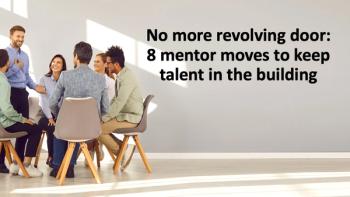
Physicians Looking for Work/Life Balance
If you find yourself searching for more balance between your work and home life, try living like you're in a jazz quartet.
I can honestly say that I'm happy to go to the office every day. I often joke that my job is my hobby. But here's the thing: I'm not kidding. I love the work that I do and usually, given the choice between work and almost anything else, I'll choose work.
But that's not always a good thing.
When you love your job, it can be really easy for your work/life balance to get out of whack. It's something that I worry about all the time. With so much expected of me on the work side of the scale, how can I ever get enough time with my family to balance things out? It feels like a war that I'll never win.
I recently read a book that put the battle of work/life balance in a difference perspective for me. In "
I love this quote from the book:
"A better metaphor for our quest comes from the jazz quartet: becoming a total leader is analogous to playing richly textured music with the sounds of life's various instruments. It is not about muting the trumpet so the saxophone can be heard. Unless you seek ways to integrate the four domains of your life and find the potential for each part to help reduce success in the others, you cannot then capitalize on synergies in places most of us don't see or hear."
If a good quartet needs four distinct sounds, a good life needs four distinct areas. Friedman refers to these areas as life domains: work/career, home/family, community/society, and self (mind, body, spirit) as the key domains of your life.
Once I started looking at balance this way-where different parts of my life weren't fighting for my attention but complementing one another-I felt more confident about my ability to tackle some of the imbalance. I have a long way to go, but here are some of the things I've learned so far.
1. We don't always spend time on the things that are most important to us.
The most sobering part of the Total Leadership model is accounting for your time-and evaluating how much time you put toward the four domains of your life.
I ranked these areas by importance. Family was at the top of the list, followed by self, my career, and then making a difference in the community. But I quickly realized that I wasn't prioritizing my time in the same way. I'm doing pretty good with my family and work, but I'm not spending as much time on my own health as I'd like and I'm basically failing when it comes to work in the community. It was a little depressing.
2. Finding crossover opportunities is key.
Luckily, balance doesn't mean spending the same amount of time on everything. The secret is finding the overlap between things you care about. I love my job, but I also want to be more philanthropic. It feels good when I can combine the two, like when I speak to business classes about career planning or do service projects for team-building activities. I'm proud of myself when I get to the gym, but it's better when I get to spend time working out with my husband or daughter. I'm happier at work when I bring my home life to the office-when I share stories about my kids with my team or turn to my coworkers for parenting advice.
3. It's okay to start small.
I love continuous improvement. But if I've learned anything about goals-whether personal or professional-it's that you need to set yourself up for success. If you have trouble unplugging from the office, it might not be the best idea to immediately throw out all your electronics. Instead, start by turning off your phone while you eat family dinner. Little wins will give you the confidence to keep going and to branch out into other areas you'd like to improve.
4. Including stakeholders is a must.
The only person you can ever change is yourself-but it's really hard to do it all alone. For lasting change, make sure to involve those who matter most. If you want to stop answering e-mails in the middle of the night, let your boss know that you're going to be off the grid after a certain time. If you're trying to be more present at home, tell your spouse about your goal and give him permission to call you out when you stop paying attention.
I'm not going to pretend that finding balance is easy. But the more I realize that's it not a matter of sacrificing one passion to satisfy another, the more I feel like I can accomplish it. And when I let all the instruments in my life play, it makes much better music.
Newsletter
Optimize your practice with the Physicians Practice newsletter, offering management pearls, leadership tips, and business strategies tailored for practice administrators and physicians of any specialty.










